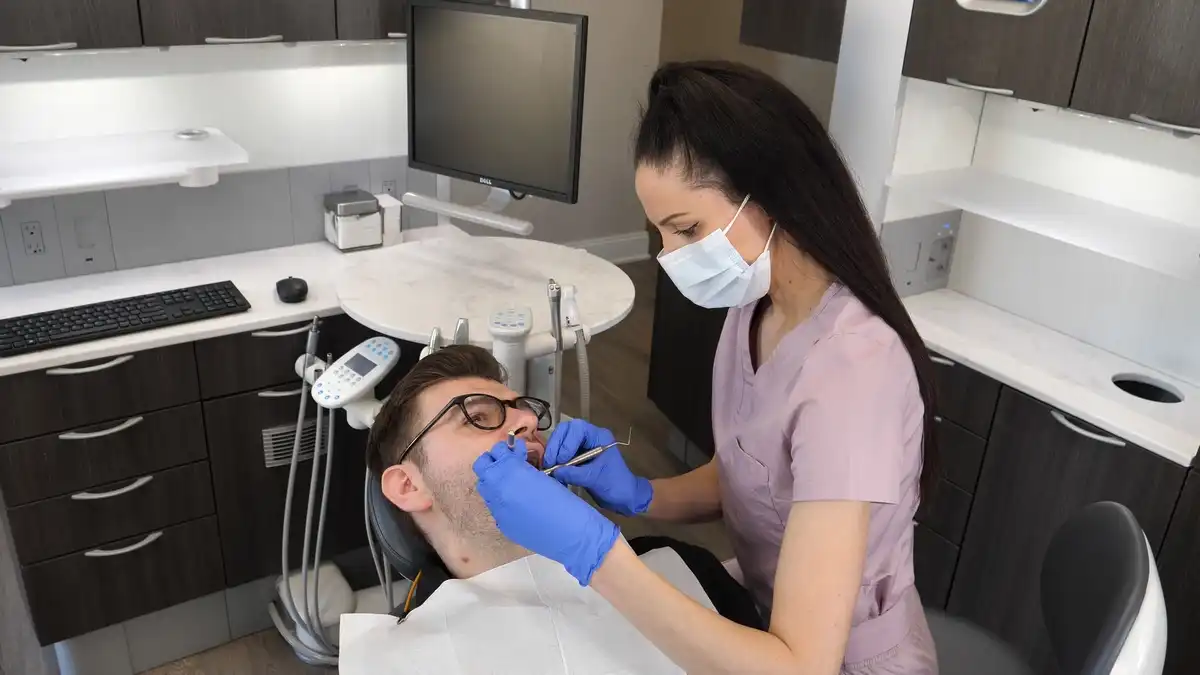5 Things I Wish Patients Knew About Dental Insurance


One of the most common misunderstandings people have in the dental office isn’t about what treatment they need; it’s why the procedure isn’t completely covered by their dental insurance or dental coverage.
As someone who has worked in the dental industry for over 20 years, here are five things I wish every patient knew about their dental insurance plan:
Understanding Dental Insurance Plans
Dental insurance plans are designed to help individuals and families cover the costs of dental care, including routine cleanings, fillings, crowns, and other procedures. These plans can significantly reduce the financial burden of dental care, making it more accessible and affordable for everyone. By having a dental insurance plan, you can ensure that you and your family receive the necessary dental services to maintain good oral health without breaking the bank.
What is Dental Insurance?
Dental insurance is a type of health insurance specifically tailored to cover dental care costs. It can be purchased individually or through an employer-sponsored plan. Typically, dental insurance plans cover a range of services, including preventive care like cleanings and X-rays, basic services such as fillings, and major services like crowns and root canals. By understanding what dental insurance is and how it works, you can make more informed decisions about your dental care and manage your dental care costs more effectively.
Dental Insurance is Prevention-Based
Dental insurance plans are designed to encourage preventive care, such as regular cleanings and check-ups. By covering these services, dental insurance plans can help prevent more costly problems from developing down the line. Preventive services may include routine cleanings, X-rays, and fluoride treatments. Taking advantage of these preventive services can help you maintain good oral health and avoid more expensive and extensive dental treatments in the future.
Choosing the Right Dental Plan
Choosing the right dental plan can be overwhelming, but it’s essential to find a plan that meets your needs and budget. Consider the following factors when selecting a dental plan:
- Coverage: What services are covered, and what are the limitations?
- Cost: What is the premium, and what are the out-of-pocket costs?
- Network: Are there in-network providers in your area?
- Maximum out-of-pocket: What is the maximum amount you’ll pay annually?
Types of Dental Insurance Plans
There are several types of dental insurance plans available, including:
- Indemnity plans: These plans pay a fixed amount for each service, regardless of the provider.
- PPO (Preferred Provider Organization) plans: These plans offer a network of providers who have agreed to discounted rates.
- HMO (Health Maintenance Organization) plans: These plans require you to choose a primary care dentist and may have limited out-of-network coverage.
Discount plans: These plans offer discounted rates for services but may not provide comprehensive coverage.
When choosing a dental insurance plan, consider your needs and budget, and carefully review the plan’s coverage, cost, and network. By doing so, you can find a dental insurance plan that provides the best value and meets your dental care needs.
1. Dental Insurance Hasn’t Increased With Dental Care Costs
Rent, automobiles, and even utilities get expensive as the years go by. While most things adjust to the cost of inflation, dental insurance is one exception to the rule.
Most dental insurance policies tend to “max out” at around $1500 a year, give or take. What most people are surprised to learn is that this is about the same amount it was three or even four decades ago. If it feels like it doesn’t cover very much treatment outside of your checkups, that’s because it doesn’t. Lab fees, materials, and cost of living have all gone up, meaning the treatments your insurance pays for have effectively gone down. Dental insurance plans often have waiting periods that impact coverage for basic and major services, which can further limit the treatments covered.
2. Dental Insurance is Based on Preventive Services
Having a dental insurance plan means your family can usually schedule dental checkups, exams, cleanings, and most X-rays twice a year without paying anything out of pocket.
But that’s where it stops.
Since dental insurance is prevention-based, it’s there to keep you up to date on preventative care. As in, services that help you prevent dental diseases like tooth decay, periodontal infections, or abscessed teeth. When you take advantage of your preventative services, you lower your chances of developing oral infections or complications that would cost both you and your insurance company money.
If you’re paying for dental insurance, you owe it to yourself to schedule a checkup every six months. Otherwise, you’re practically throwing your money away. Employees can inquire about their dental insurance benefits through their company's human resources department.
3. It’s Not Normal for Insurance to Pay for All of Your Dental Treatment
Since dental insurance is prevention based, it usually pays 100% for most preventive dental care services. With a few exceptions, like limiting sealants or fluoride treatments to younger patients.
As treatment needs go beyond preventative checkups, your insurance is “tiered” in regard to what’s covered and how much it’s covered. For example, a filling might be covered by your plan up to 80%, but a crown might only be covered at 50%. The remaining amount is what you’re responsible for, financially. Insurance will not ever, ever, ever pay 100% of the restorative treatment your smile needs. Ever.
In a worst-case scenario where you need multiple teeth repaired, there’s a chance that your insurance benefits are going to run out before you’ve even had two or three teeth treated. Insurance dental benefits reset annually—and you can’t carry them over—so whatever treatment gets delayed has a pretty good chance of evolving into a more serious issue. Delaying care could cost you more than just added treatment fees; it could result in tooth loss.
When you allow dental insurance to dictate what treatment you get or don’t get, it usually puts you in a position where your smile isn’t getting the best care. The healthier thing to do is to plan the treatment you need, based on your oral health concerns. If insurance pays toward it, great. But the longer procedures are delayed, the more complex they become; and that means your insurance will probably pay even less when it comes to the overall price of your treatment plan.
4. You Probably Don’t Need to Change Dental Insurance Companies
Most dental insurance plans all work similar to one another. If you’re worried that one company isn’t as good as another and that you need to switch, you probably don’t. Much of it depends on who your dentist is in-network or “participating” with.
Why do some dentists choose not to be in-network with an insurance carrier? Because if they sign a contract with them, they have to price their services based on the insurance company’s fee schedule. And on top of that, the insurance company only pays a percent of those fees, not the entire 100%. Some of these fees are so low that it makes it difficult for the dental office to pay staff, keep the lights on, and turn any type of a profit on top of that (and let’s face it, dental offices are small businesses and your dentist is probably still paying off their student loans.)
Consider the following factors when selecting a dental plan:
Network of Providers: Ensure that there are in-network dental providers in your area. This is crucial for accessing necessary oral health care services, especially for children under programs like CHIP and Medicaid. States are required to post listings of participating dental providers to help you make an informed decision.
5. If You Don’t Have Dental Insurance, That’s OK
Having dental insurance is great, especially when it’s an affordable plan available through your employer. But if you don’t have dental insurance, that’s ok too.
There are plenty of other affordable options out there for people to access affordable dental care without insurance.
Example 1: Private in-house dental membership plans.
A lot of dentists are starting to offer private in-house membership programs or dental clubs to their patients without insurance. These plans work similarly to insurance but without annual maximums or limits. Instead, you pay an annual fee to join, which covers all of your checkups, cleanings, and other preventative care. Then any extra treatment you need, whether it’s veneers, whitening, fillings, braces, or something else, receives a fixed discount on the normal price. You know exactly how much it will cost from the get-go without any guesswork. There are no limitations or maximums. Some plans may also offer virtual dental care options.
Example 2: Discount dental plans.
Think of these like a Costco or Sam’s Club membership. You use your discount card at any participating location and get access to lower prices on your dental treatment without having to file any insurance claims or guessing about what’s covered. Dental plans cover dental implants to vision benefits. It’s a flat percentage off of your dental services as long as that dentist participates in the plan. Aetna, Careington and Delta Dental companies offer similar discount plans.
In addition to these two options, some dentists will also offer a cash discount. Or you might be lucky and have a dental school near you, where the fees are extremely low.
When in Doubt, Talk With Your Dentist
If you’re delaying dental treatment because you feel frustrated by your lack of insurance coverage, you’re not alone. Talk to your dentist about alternatives to insurance or optional treatments that may be more affordable to maintain good dental health. Their financial coordinator will be more than happy to discuss how your plan applies to the care you need and if another—more affordable—option is available.
You should make the best decision about your smile, not your insurance company.

Make your inbox smile!
Subscribe




